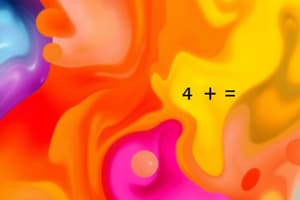Podcast
Questions and Answers
What is the condition that a probability density function (PDF) must meet regarding its integral over the real line?
What is the condition that a probability density function (PDF) must meet regarding its integral over the real line?
- The integral of the PDF must be greater than 1.
- The integral of the PDF must be less than 1.
- The integral of the PDF must equal 0.
- The integral of the PDF must equal 1. (correct)
What does the cumulative distribution function (CDF) represent for a continuous random variable X?
What does the cumulative distribution function (CDF) represent for a continuous random variable X?
- The probability density at a specific value of X.
- The probability that X is less than or equal to a specific value. (correct)
- The area under the PDF curve for all values.
- The probability that X is equal to a specific value.
Which of the following statements about a continuous random variable X is correct?
Which of the following statements about a continuous random variable X is correct?
- P(X = a) is always greater than 0 for any real number a.
- P(a ≤ X ≤ b) is the area under the PDF from a to b. (correct)
- P(X < a) is equal to P(X ≤ a).
- The mean of X is always equal to the median of X.
If the derivative of the cumulative distribution function (CDF) F(x) exists, what does it represent?
If the derivative of the cumulative distribution function (CDF) F(x) exists, what does it represent?
What is true about the variance of a continuous random variable X?
What is true about the variance of a continuous random variable X?
What is the formula for the mean or expected value of a continuous random variable X?
What is the formula for the mean or expected value of a continuous random variable X?
How is the variance of a continuous random variable X defined?
How is the variance of a continuous random variable X defined?
What expression represents the standard deviation of X in terms of variance?
What expression represents the standard deviation of X in terms of variance?
Given the cumulative distribution function F(x), how do you find the probability density function f(x)?
Given the cumulative distribution function F(x), how do you find the probability density function f(x)?
If Y = 3X + 1, how is the expected value E(Y) related to the expected value E(X)?
If Y = 3X + 1, how is the expected value E(Y) related to the expected value E(X)?
For the continuous random variable defined by $f(x) = 0.125x$ for $0 < x < 4$, how do you determine the mean?
For the continuous random variable defined by $f(x) = 0.125x$ for $0 < x < 4$, how do you determine the mean?
What is the calculation for P(X < -2) given the piecewise cumulative distribution function?
What is the calculation for P(X < -2) given the piecewise cumulative distribution function?
If the variance of X is defined as $σ^2 = V(X)$, which option correctly describes its meaning?
If the variance of X is defined as $σ^2 = V(X)$, which option correctly describes its meaning?
Flashcards are hidden until you start studying
Study Notes
Continuous Random Variables
- A continuous random variable can be any value within a given range
- Its range can be finite or infinite
- It's represented by an interval of real numbers
Probability Density Function (PDF)
- A function that describes the probability distribution of a continuous random variable
- Represents the probability of a random variable taking on a specific value within a given range
- Has the following properties:
- The function is always greater than or equal to zero
- The area under the curve between negative infinity and positive infinity is equal to 1
- The probability of a random variable falling between two values is equal to the area under the curve between those two values
Cumulative Distribution Function (CDF)
- Represents the probability that a continuous random variable takes a value less than or equal to x
- Can be used to calculate the PDF for a continuous random variable if the derivative exists
Mean and Variance of a Continuous Random Variable
- Mean (µ or E(X))
- The average value of the random variable
- Calculated by integrating x multiplied by the PDF
- Represents the expected value of the variable
- Variance (σ² or V(X))
- Measures how spread out the distribution is
- Calculated using the formula: ∫(x - µ)² ⋅ f(x) dx or ∫x² ⋅ f(x) dx - µ²
- Standard deviation (σ)
- The square root of variance
- Represents the average deviation of the variable from the mean
Expected Value
- Can be calculated for a function of a continuous random variable
- Formula is: ∫h(x) ⋅ f(x) dx where h(x) is the function and f(x) is the PDF
- Represents the expected value of the function of the random variable
Studying That Suits You
Use AI to generate personalized quizzes and flashcards to suit your learning preferences.




